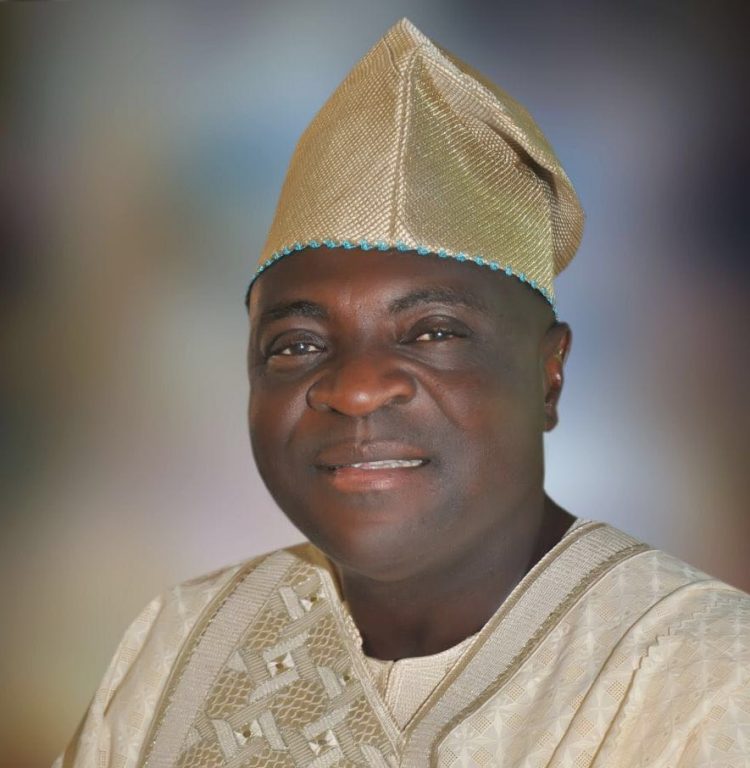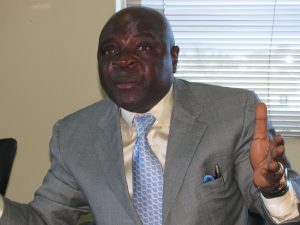Headlines
Olusola Adekanola at 64 says agriculture way forward for Nigeria
The ARGP, pioneered by OA & Co., was an innovation; a revolution that transformed revenue generation strategy of governments at the state level and radically boosted their revenue earnings from taxes, levies, fees and penalties in doubles, triples and even quadruples.

…It is laughable to reduce budget by 0.6% when you have lost 70% of anticipated revenue due to oil price collapse
BY KAZIE UKO
In its heyday, as a tax consulting outfit, Olusola Adekanola & Co., ruled Nigeria’s revenue generation landscape as the go-to company. With over 30 states of the federation as clients in its kitty at the time, the firm of chartered accountants and tax practitioners bestrode the corporate and public sectors as a colossus.
Otunba Olusola Adekanola, the embodiment of the OA & Co vision, was an unassuming looking young man, barely in his late 30s. He was the most sought-after personality within government circle, especially between the period 1994 and 1999. Those were difficult years for the Nigerian economy, run by the military who wielded executive power at both the federal and state levels.
As it is today, so it was then. Revenues from federation account accruing to the states were not enough to execute much needed services and infrastructural projects. Every now and then, Military Administrators who served as governors in the states went cap-in-hand to the Head of State in Abuja for bailout. But things soon came to a head when Abuja read the riot act to the Milads, as the Military Administrators were often called: perform or leave!
With nowhere to turn to, the gospel according to Olusola Adekanola became the revelation that the Milads needed both to remain in office and to discharge their responsibilities to the citizens of their various states.
Starting from Niger State in 1994 and moving down south to Rivers State and to the west, Lagos State, in 1996 and spreading across the six geo-political zones of the country, the internal revenue boosting gospel of Olusola Adekanola & Co., christened, Accelerated Revenue Generation Programme (ARGP), became the magic wand that successive Milads had to lean on to perform in office.
The ARGP, pioneered by OA & Co., was an innovation; a revolution that transformed revenue generation strategy of governments at the state level and radically boosted their revenue earnings from taxes, levies, fees and penalties in doubles, triples and even quadruples.
With the ARGP, contact between civil servants and government money was severed, first time in Nigeria’s history. Every revenue accruing to a state government was paid directly into select approved banks in what was then known as the Direct Bank Lodgement System (DBLS). This marked the beginning of public-private partnership in revenue generation. This process would soon be upgraded to the electronic Strategic Tax Administration and Revenue Accounting system (eSTARs), first of its kind application that managed tax administration and the relevant database.
The objective of the ARGP, Otunba Adekanola would explain to the members of the council of the Lagos Chamber of Commerce and Industry on Thursday, October 2 1997, at an interactive session in Lagos, was simply to help states and local governments to realise their internal revenue generation potentials.
READ: Nigeria not ready for full reopening of economy, extends lockdown
“I would like to state very clearly that our assignment is strictly a professional one and we conduct it as such. The exercise itself arose out of a need to assist states and local governments to realise their internal revenue generation potentials. With the decline in internal revenue in the past years, it became clear that state governments, through their revenue agencies could do very little on their own, hence the need for outside assistance,” Adekanola told the circle of corporate Lagos led by prominent industrialist and business mogul, Chief Kola Daisi.
The ARGP was a huge success for all who were part of it. It brought much more money to the states and local governments; the participating banks earned their income for providing the platforms for this novel idea to flourish and of course the initiating firm of the programme, Olusola Adekanola & Co earned its fees. The ARGP revolutionised and professionalised tax practice in Nigeria. It brought honour and prestige to practitioners who would now see taxation as a profession rather than mere job that people were employed to do in derelict looking government offices and road sides.
The programme also created employments for professionals, especially chartered accountants, tax practitioners and lawyers. “At a point, we had a staff strength in the excess of 5,000. As we took on new states, we deployed some tested hands, we went into the states and generated more employment,” Adekanola recalled in a conversation with him.
At the turn of the new millennium, after politicians had taken over government in all the three tiers and firmly had their hands on the levers of governance, the influence of the ARGP as had been established by Olusola Adekanola & Co ebbed. In most of the states where it had consulted, the firm with its founder was stereotyped. Tribe, state of origin and political affiliation became issue of great concern and importance, if the firm was going to be retained. Merit, professional competence and track record of achievements never made the criteria for continued engagement. Eventually, in most of these states, government revenue generation business became an avenue to compensate political patrons.
Adekanola would move on from the states and local governments to the federal. But not in the mould of the ARGP. The federal government, desirous of shoring up revenue in the face of dwindling oil money, had wanted to free up some of its assets to private sector investors, but met with little success. One national asset, National Fertiliser Company of Nigeria Limited (NAFCON), in Rivers State, stood out for mention.
READ: Ibrahim Agboola Gambari: A Presidential Babysitter who won’t be as powerful as Abba Kyari
NAFCON had been offered for sale by the Bureau of Public Entreprises (BPE). A core investor with a bid price of $75 million had won and expected to pay 50 percent within a specific period, but this was not to be. BPE had to go back to the drawing board and following the approval of the National Council on Privatisation (NCP), a decision was reached to liquidate the fertiliser plant and save the federal government the headache of piling up more liabilities since the plant had become moribund.
The lot of liquidating NAFCON fell on Otunba Olusola Adekanola. This was in 2006. As a court-appointed liquidator, Adekanola brought his golden touch to bear on the assignment. NAFCON was eventually liquidated at a bid price of $152 million, twice more than the initial $75 million. Liabilities outstanding to creditors were negotiated and paid off.
The resounding success of NAFCON liquidation endeared Adekanola to the federal authorities who enlisted him as a liquidator for more national assets that had been run down, abandoned and allowed to rot while they continued to generate liabilities for the federal government. He was successful at every turn.
In all his years as a revenue consultant to the government, Adekanola had always preached the need for government to be prudent with money and more importantly diversify the economy so that internally-generated revenue can grow. For him, oil is a wasting asset and would one day dry up.
Today, oil may not have dried up in the real sense of it as Adekanola had anticipated, but revenue from oil is fast drying up, no thanks to the coronavirus pandemic that is currently ravaging the world and its economies.
“You don’t need a soothsayer to tell you that again. In five years, we may be drinking our oil,” Adekanola retorted, when asked if Nigeria had arrived that day that crude oil may not count as revenue earner for the country.
…Agriculture way forward
Adekanola, a golf enthusiast and patron, who is celebrating his 64th birthday today, May 19, 2020, said the only way out for Nigeria in the face of revenue crisis from oil is to go back to the land, not for more oil, but to grow food and produce for her teeming population and to get the factories working again.
“Go back to agriculture and manufacturing. No short cuts,” he admonished the government unmistakably. “It’s stupid to borrow money to plug revenue shortfall and thereafter use the loan to meet recurrent expenditure. It is laughable to reduce your annual budget by 0.6 percent when you have lost 70 percent of your anticipated revenue due to oil price collapse. Saudi Arabia cut their budget by 30 percent,” he further schooled.
We reminded him that the present government had paid a lot of attention in agriculture through various financing options and interventions, including the closure of the nation’s land borders, and wondered what more he would have the government do. But he would have none of that as he asked rather rhetorically: “Who’s giving the so called Agric loan? What’s put in place to buy up farm produce to assure farmers their stuff will not rot before they get them to market?”
He added: “We have Fadama landscape spanning one quarter of our country that can grow rice all the year round. Government can bring Israel or Thailand to teach our people, divided into co-operatives, how to farm the land. We have no business importing food.”
Adekanola advised government to henceforth dedicate all available forex to manufacturing to generate employment and “allow us to reorder our consumption pattern to locally made goods.” He said government should reactivate cotton farming and restore all moribund textile mills. “It’s not rocket science. These are basic doable stuff to regenerate the economy away from oil that has turned to our albatross,” he affirmed.
For a man who had spent most of his professional life preaching about internal revenue generation, RELIABLESOURCENG.COM asked him the possibility of the country increasing its internal revenue at this time in order to strengthen its financial base. Adekanola described our suggestion as a case of placing the cart before the horse.
He queried: “How do you generate or enhance IGR from non-economy? You rebuild your economy first. I haven’t heard anything about what the federal government is planning for companies most impacted by the lockdown and new social guidelines. Or they want the airlines/tourism and entertainment companies to die? What about manufacturers whose production lines were shut down for weeks? You heard about palliatives given in trillions in US and Europe? Is Nigeria an island? They are throwing bogus figures all over the place that they claimed to have spent on Coronavirus. Spare me, I beg.”

